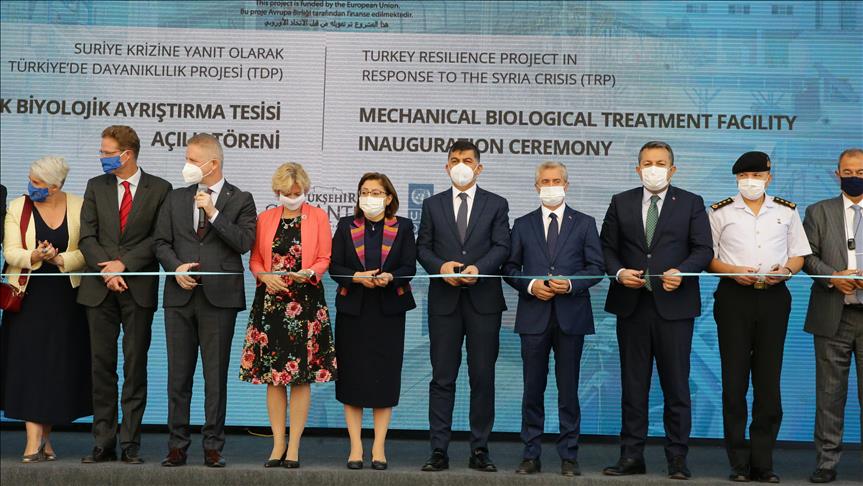A state-of-the-art waste management facility in Gaziantep, funded with €9.2 million by the European Union (EU) and built by the United Nations Development Program (UNDP), became operational on Tuesday.
Ilbank and Gaziantep Metropolitan Municipality partnered in the building of the Mechanical Biological Treatment Facility (MBTF), with the capacity to process 100,000 tons of solid waste per year. It is one of the largest in Europe and an exemplary model of circular economy principles.
The facility will help the city to meet daunting challenges in waste management, which increased in the last years due to the growing number of Syrians feeling the civil war in their own country.
Gaziantep had 1.7 million residents before the Syria crisis began, but its population swelled to over 2.2 million with an influx of more than 450,000 Syrians under temporary protection. The increase in population resulted in an increase of waste by 25%.
Gaziantep Province Governor Davut Gul, Ambassador Nikolaus Meyer-Landrut at the head of a delegation of Ambassadors from 9 EU member states, Gaziantep Mayor Fatma Sahin, Ilbank representatives and UNDP Resident Representative Louisa Vinton attended the opening ceremony for the facility.
Speaking at the opening ceremony, Meyer-Landrut said that Turkey demonstrated remarkable hospitality while hosting nearly four million Syrians fleeing civil war in their own country.
"We recognize the stress this influx has put on host communities across Turkey. That is why we have invested in municipal waste management in Gaziantep as part of our broader €6 billion assistance program. The EU will continue to support Turkey in hosting the refugees with additional €3 billion in the upcoming period," he said.
The facility is the largest of eight waste-management facilities that UNDP constructed in the southeastern Turkey since 2018 with EU funding.
When fully operational, the facility will generate new revenues for the budget of the city thanks to its biogas and recycled resources.
"This new facility will help us meet our responsibility to deliver essential public services," Mayor Sahin said. "But it is much more than that. It will help ensure that we can manage other challenges posed by sudden expansion in the city’s population."
According to UNDP, the MBTF - equipped with state-of-the-art technology - will generate clean energy from biodegradable waste, separate recyclables and extend the life of Gaziantep’s solid waste landfill.
Annual output will include 4,100 megawatt-hours of electricity, 17,000 tons of recyclables and 23,000 tons of reclaimed refuse-derived fuel.
The electricity produced at the facility will fully power its operations while generating a surplus for sale, creating a new revenue stream for the municipality.
The recyclable waste reclaimed at the facility will also generate income and the facility will reduce Gaziantep’s annual greenhouse gas emissions by 9,309 tons of CO2.
UNDP’s Vinton said that the new plant is an investment in a greener future for the city and Turkey.
"Not only are we helping Gaziantep expand its delivery of vital public services, we are also showing by example how cities can find sustainable, environmentally-friendly ways to meet the needs of their constituents. In this case, quite literally, by transforming garbage into a valuable resource that can help fill rather than empty the city budget," Vinton said.
By Nuran Erkul Kaya
Anadolu Agency
energy@aa.com.tr


